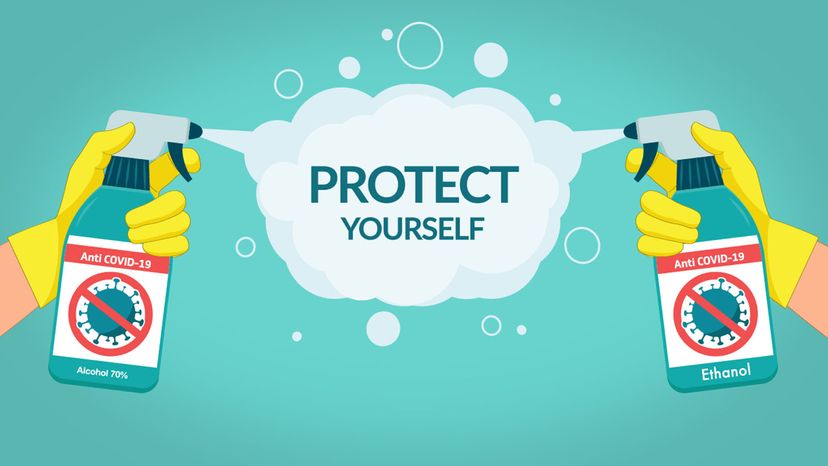
Washing our hands with soap and water is the No. 1 way to kill and remove bacteria and viruses, but we're not always just hanging around a sink when we need one. That's when a little bottle of hand sanitizer comes in very handy. So portable! So easy! So effective!
Then in the early days of the novel coronavirus pandemic, the United States ran into a shortage of hand sanitizer. But not to worry — distilleries had lots of alcohol on hand. They pivoted to manufacturing bottles of hand sanitizer to fill the gap and refill the very, very empty shelves at stores.
Advertisem*nt
But is the alcohol in whiskey or vodka the same as alcohol in regular hand sanitizer? The short answer is not exactly, but it's fine. Here's why.
Ethyl vs. Isopropyl Alcohol
The most common hand sanitizers use isopropyl alcohol, aka isopropanol, 2-propanol or just rubbing alcohol. You might have a bottle of it under your bathroom sink. You cannot drink this stuff without getting sick, and it will not get you drunk.
The alcohol you can drink is ethanol, aka ethyl alcohol or grain alcohol. You might have a bottle of this in your liquor cabinet, since it's the kind of alcohol in any liquor that's distilled from grain, like whiskey. You can definitely get drunk on this stuff; your tolerance may vary. The ethanol in hand sanitizer, however, is denatured and will not make you drunk, but it will make you very sick.
Advertisem*nt
These two alcohols have similar structures, but their chemical variations are enough to make one drinkable and one dangerous to ingest. But when it comes to hand sanitizer, they work the same way: They both disrupt the proteins and lipids in viruses and bacteria, which kills those germs. The U.S. Centers for Disease Control and Prevention recommends a solution of 65 to 95 percent alcohol using either ethyl alcohol or isopropyl alcohol in any hand sanitizer to do the job.
Die Germs, Die!
If a little alcohol is good at killing germs, isn't more better? Why stop at 65 or 70 percent alcohol when you can go all the way to 100 percent? Because it turns out 100 percent alcohol is actually less effective at dealing death to those dastardly diseases.
When the alcohol begins to do its work on bacteria, for instance, the injury to the cell can cause the bacteria to form a protective shell. That's bad. Viruses don't form those protective shells, but higher concentrations of alcohol evaporate very quickly — maybe before it penetrates the virus' outer walls. That's also bad.
Advertisem*nt
Adding water, which evaporates more slowly than alcohol, means the alcohol in the solution lingers longer on your hands. Adding a few other ingredients, like hydrogen peroxide and glycerol, make the solution even more effective.
That evaporation factors into our comfort too. Ethanol is more dehydrating, and we can feel that when we use it on our skin. It can make our skin feel tight and dry. Isopropyl alcohol evaporates more quickly, but it doesn't dry out our hands so badly. (That same quicker evaporation rate is why we use rubbing alcohol to clean electronics.)
Now That's History
Isopropyl alcohol got the more common name "rubbing alcohol" in the 1920s because it was used in liniments rubbed into the skin for health and healing. This was also the Prohibition era, so this "good" alcohol needed to be set apart from the "bad" ethanol alcohol that was banned at the time, thanks to the 18th Amendment.
Advertisem*nt
Ethanol Alcohol and Isopropyl Alcohol FAQ
What is isopropyl alcohol commonly used for?
Isopropyl alcohol is most commonly used as a rubbing alcohol antiseptic. You can also find it in many cleaning and disinfecting products, such as hand sanitizers, aftershaves and stain removers.
What does isopropyl alcohol kill?
Isopropyl alcohol has antimicrobial properties that make it capable of killing many microorganisms, such as bacteria, germs and fungi.
Is isopropyl alcohol safer to use on the skin than ethanol?
Isopropyl alcohol is generally safer than ethanol unless you spill large amounts of it on your skin, which can result in itching, cracking and redness. Ethanol is more dehydrating and causes skin discomfort whereas isopropyl alcohol evaporates faster.
Why is 100 percent isopropyl alcohol less effective than a solution?
100 percent isopropyl alcohol is less effective than 65 or 70 percent because higher concentrations evaporate more quickly. This means that it cannot necessarily kill germs and viruses before it evaporates. Adding hydrogen peroxide or water allows the solution to do it's "job" longer, making it more effective at killing germs.